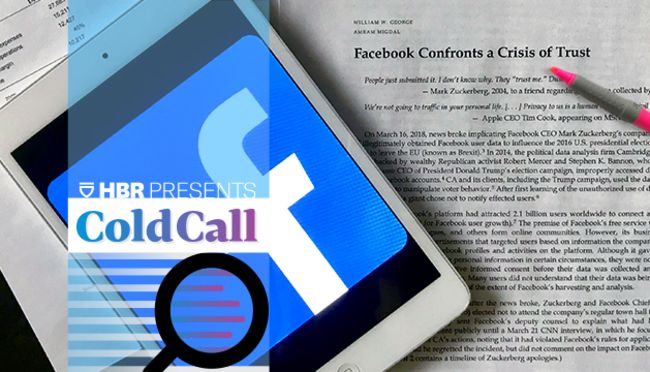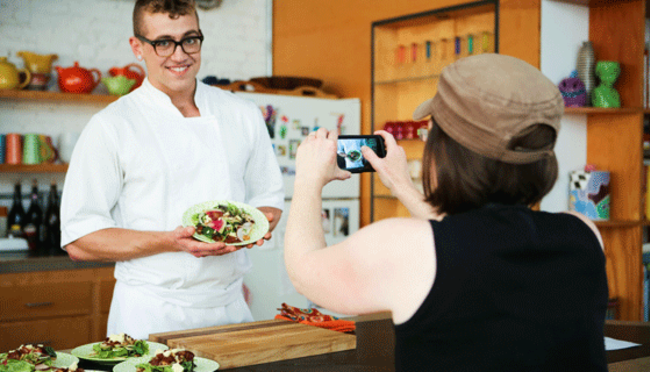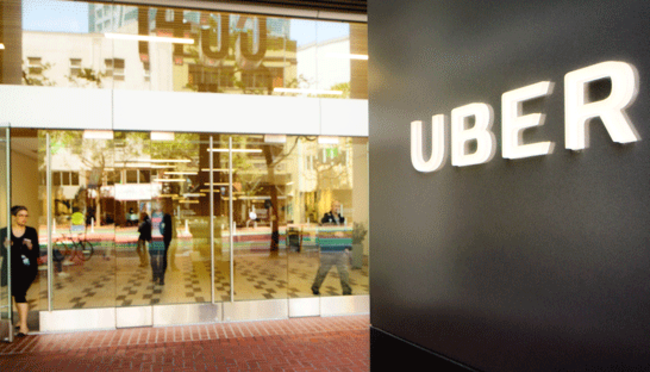Customer Relationship Management →
→

- 09 Dec 2019
- Research & Ideas
Identify Great Customers from Their First Purchase
Using data from their very first transaction, companies can identify shoppers who will create the best long-term value, says Eva Ascarza. Open for comment; 0 Comments.

- 11 Jul 2019
- Sharpening Your Skills
Deconstructing 'Customer Experience'
Providing great customer service is no longer the responsibility of just one department. Today it's called "customer experience," and everyone in the company is responsible for exceeding expectations. Open for comment; 0 Comments.

- 04 Apr 2019
- Cold Call Podcast
Can Mark Zuckerberg Rebuild Trust in Facebook?
Bill George discusses his case study, "Facebook Confronts a Crisis of Trust," including why Zuckerberg handled the crisis as he did, the role of companies in protecting privacy, and the pros and cons of regulation. Open for comment; 0 Comments.

- 26 Mar 2019
- Working Paper Summaries
Mitigating the Negative Effects of Customer Anxiety Through Access to Human Contact
Firms increasingly deploy self-service technologies (SSTs) to manage customer interfaces that are inherently stressful. For example, patients may be asked to use kiosks to check themselves into hospitals. This study finds that customer anxiety during SST transactions can reduce customers’ trust in the service provider. Operational design choices may help.

- 04 Mar 2019
- What Do You Think?
What’s the Antidote to Surveillance Capitalism?
SUMMING UP: As companies increasingly build business models around our personal data, what can be done to fight back? James Heskett's readers suggest there are no easy answers. Open for comment; 0 Comments.

- 10 Oct 2018
- Research & Ideas
The Legacy of Boaty McBoatface: Beware of Customers Who Vote
Companies that encourage consumers to vote online should be forewarned—they may expect more than you promise, according to research by Michael Norton, Leslie John, and colleagues. Open for comment; 0 Comments.

- 10 Jul 2017
- Op-Ed
Op-Ed: It’s a Bad Idea to Ban Customers From Recording Videos
With videos of bad business practices routinely going viral, it might be tempting to prohibit customers from recording their surroundings. But banning cameras is the wrong way to go, says Benjamin Edelman. Open for comment; 0 Comments.

- 29 Jun 2017
- Research & Ideas
Why Uber Is Worth Saving and How To Do It
For many, Uber is a cautionary tale of corporate hubris gone crazy. But Rosabeth Moss Kanter argues the innovator deserves a second chance. Open for comment; 0 Comments.
- 17 Apr 2017
- HBS Case
This Turkish Debt Collector Is Customer-friendly
A Turkish-based company pioneers a kinder, gentler method of collecting debt that Professor Dennis Campbell sees as an international model. Open for comment; 0 Comments.
- 06 Jun 2012
- What Do You Think?
Is Something Wrong with the Way We Work?
Summing Up Who is to blame for our pressure-packed 24/7 work culture? Technology? Globalization? Increasingly demanding customers? Jim Heskett's readers say it's best to first look in the mirror. Closed for comment; 0 Comments.
- 10 Jan 2011
- Research & Ideas
Is Groupon Good for Retailers?
For retailers offering deals through the wildly popular online start-up Groupon, does the one-day publicity compensate for the deep hit to profit margins? A new working paper, "To Groupon or Not to Groupon," sets out to help small businesses decide. Harvard Business School professor Benjamin G. Edelman discusses the paper's findings. Key concepts include: Discount vouchers provide price discrimination, letting merchants attract consumers who would not ordinarily patronize their business without a major price incentive. These vouchers also benefit merchants through advertising, simply by informing consumers of a merchant's existence via e-mail. For some merchants, the benefits of offering discount vouchers are sharply reduced if individual customers buy multiple vouchers. As a marketing tool, discount vouchers are likely to be most effective for businesses that are relatively unknown and have low marginal costs. Closed for comment; 0 Comments.
- 27 Aug 2007
- Op-Ed
Mattel: Getting a Toy Recall Right
Mattel has been criticized heavily for having to recall not once but twice in as many weeks 20 million toys manufactured in China. But Mattel also deserves praise for stepping up to its responsibilities as the leading brand in the toy industry. Harvard Business School professor John Quelch examines what Mattel did right. Key concepts include: Mattel's recall of 20 million toys made in China was handled deftly: The CEO took personal charge of the problem. Consumers are being empowered by Mattel's communications. The recall Web site is a model of excellence. Mattel's compensation program to customers may not be sufficient. Closed for comment; 0 Comments.

Delivering a Personalized Shopping Experience with AI
THE YES, a shopping app for fashion brands, uses a sophisticated algorithm to create and deliver a personalized store for every shopper, based on her style preferences, size, and budget. After launching the app in 2020, the founders had to decide whether to continue developing the algorithm to deliver on the company’s customer value proposition or to focus their resources on new customer acquisition, with the idea that more users on the app would improve the algorithm's performance. Senior Lecturer Jill Avery and The YES co-founder and CEO Julie Bornstein discuss this make-or-break dilemma in the case, The YES: Reimagining the Future of e-Commerce with Artificial Intelligence (AI). This episode was recorded live at Harvard Business School on March 30, 2022 as part of our Case Method 100 celebration.